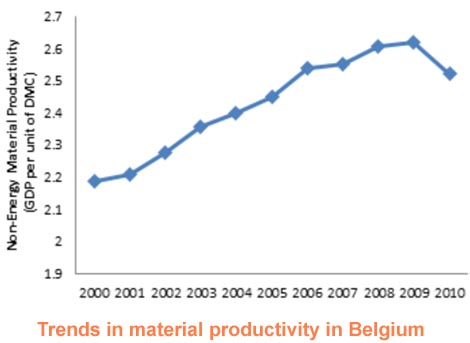 Resource
efficiency has become a priority for policymakers
of Belgium. The total
domestic material consumption (DMC) of the country is 2.47% of the
average DMC of Europe. Among materials, mineral consumption ranks
highest followed by biomass and fossil fuels1. While the
non-energy material productivity has increased from 2.18 in 2000 to 2.52
GDP per unit of DMC in 20102, the strong dependence of its
economy on imported resources is a cause of concern. The willingness of
Belgium to introduce resource efficiency stems from this.
Resource
efficiency has become a priority for policymakers
of Belgium. The total
domestic material consumption (DMC) of the country is 2.47% of the
average DMC of Europe. Among materials, mineral consumption ranks
highest followed by biomass and fossil fuels1. While the
non-energy material productivity has increased from 2.18 in 2000 to 2.52
GDP per unit of DMC in 20102, the strong dependence of its
economy on imported resources is a cause of concern. The willingness of
Belgium to introduce resource efficiency stems from this.
Policy Approach for Resource Efficiency
The policy framework of the country is divided region wise. While there
is not a specific resource efficiency strategy, the issue is part of
several federal strategies, actions plans and policy initiatives such as
the Federal Plan for Sustainable Development and the Federal Products
Plan (2009-2012). The Federal Plan for Sustainable Development
lists several measures and actions aimed at improving resource
efficiency and at managing natural resources more responsibly. The
Federal Products Plan aims to improve the environmental quality of
products in the market through instruments such as standardisation,
certification and labelling, economic incentives etc.
Brussels Capital Region
Resource efficiency is incorporated in the Regional Policy Statement
and Regional Waste Prevention and Management Plan of the Brussels
Capital Region. The Fourth Regional Waste Plan was approved in 2010.
Reinforcing the idea of dematerialisation, it foresees the development
of an integrated ‘eco-construction’ approach to minimise impacts of
construction on the environment through life-cycle by prevention, reuse
and recycling. The strategies include:
• Preventing use of resources and waste generation
• Promoting renovation rather than new construction
• Promoting efficient use of sustainable materials
• Selective deconstruction
• Reusing materials without prior treatment
• Recycling waste into secondary raw materials
• Use of alternate fuels including waste
Disposal of materials is seen as the last reserve. The plan has set
measurable targets to reduce waste and achieve resource efficiency. For
the construction sector, it aims to achieve recycling of 90% of
construction and demolition waste by 2020.
Flanders Region
The Pact 2020 of the Flemish government spells out their long-term
vision and strategy for development. Decoupling from economic growth,
emissions and waste production by 2020 is one of its objectives. It aims
to achieve this by promoting sustainable use of natural resources by
improving efficiency and eco-innovation. Special attention is given to
sustainable living and building.
Strategic Policy Plan 2010 – 2015 on Waste, Materials and Soil
Management aims to minimise the use of finite resources, prevent
waste generation and maximise waste use as a secondary resource. In
2011, the Flemish government translated the Sustainable Materials
Management Programme into an economy-wide strategy. The main focus
was on organising and managing sustainable material cycles, increasing
the use of secondary raw materials in the production process and
minimising impacts on the environment resulting from raw material mining
and processing.
The Sectoral Implementation Plan on Environmentally Sound Material
Use and Waste Management in the Building Industry for the period
2007-2010 described the policy planning for the management of materials
and waste in the Flemish building trade. The projects included selection
demolition, research on environmentally sound material use in building
trade, recycling of stoniness fractions and other materials and
development of a global management system for debris granules.
Walloon Region
The Regional Policy Statement, Waste Plan 2020, Walloon Plan for
Sustainable Use of Energy and others address the aspects of resource
efficiency in the region. Their focus is on use of waste and its
by-products, sustainable water and forest management, conservation of
soil and energy efficiency.
The efforts of Belgium in decoupling economic growth from resource use
have been revolutionary. The impacts and the lessons learned from the
implementation of these policies should be well documented and
disseminated for wider replication.
q
D. Varsha
dvarsha@devalt.org
Endnote
1 EEA (2011). Belgium: Country Information on Resource
Efficiency Policies, Instruments, Objectives, Targets and Indicators,
Institutional Setup and Information Needs. European Environment Agency,
Copenhagen
2 www.stats.oecd.org
References
EEA (2011). Resource Efficiency in Europe.
Policies and Approaches in 31 EEA Member and Cooperating Countries.
European Environment Agency, Copenhagen